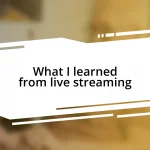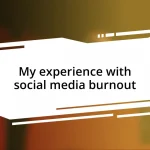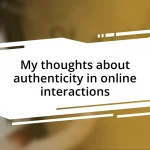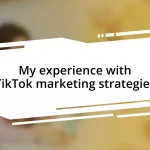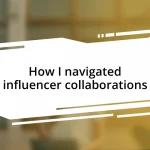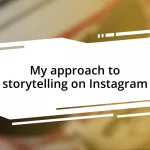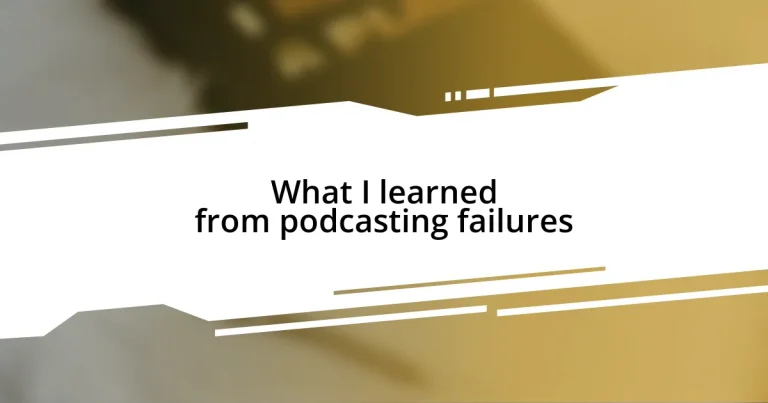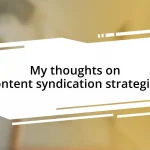Key takeaways:
- Failures in podcasting serve as valuable learning experiences, teaching lessons about audio quality, niche focus, and marketing.
- Engaging with the audience and adapting based on their feedback fosters community and improves content relevance.
- Consistent release schedules and effective promotion are crucial for building trust and growing a listener base.
- Documenting experiences and maintaining flexibility in planning can lead to innovative content and better resilience in the face of setbacks.
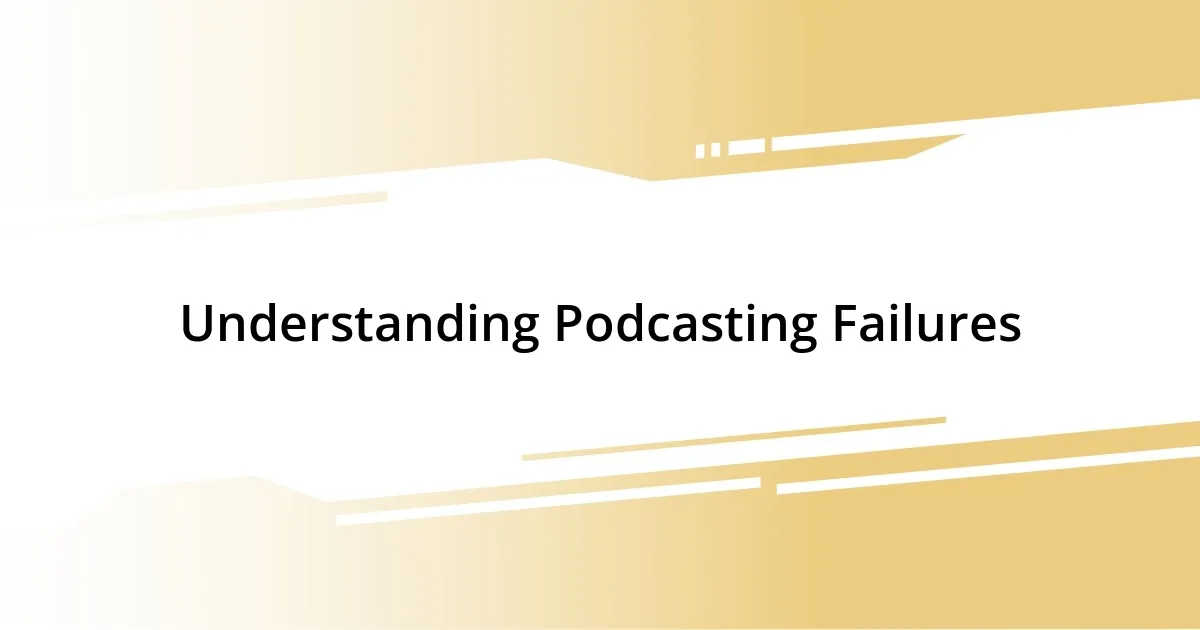
Understanding Podcasting Failures
Understanding podcasting failures can feel like navigating a labyrinth with no clear exit. Ultimately, every misstep, whether it’s poor audio quality or inconsistent scheduling, teaches a lesson. I remember my first podcast; I was so passionate, yet I skimmed over the need for a good microphone. The result? My early episodes sounded like I was recording in a bathroom. That taught me how crucial audio clarity is.
Sometimes, I wonder if the fear of failure holds many aspiring podcasters back. I’ve met a lot of creators who let the fear of not being perfect stop them from launching. I’ve been there myself—hesitating to release episodes because they weren’t “good enough.” But here’s the thing: imperfection can lead to growth. Each mistake I made pushed me to refine my content. I started viewing failures as stepping stones rather than roadblocks.
Failures can be frustrating, but they provide an invaluable opportunity for reflection. I analyze what went wrong: Was it the topic choice? The pacing? I recall an episode that fell flat because I failed to engage my audience with interactive questions, which left me feeling disconnected from them. Understanding what didn’t resonate is just as important as celebrating what works, and it’s this introspection that truly sharpens my skills as a podcaster.
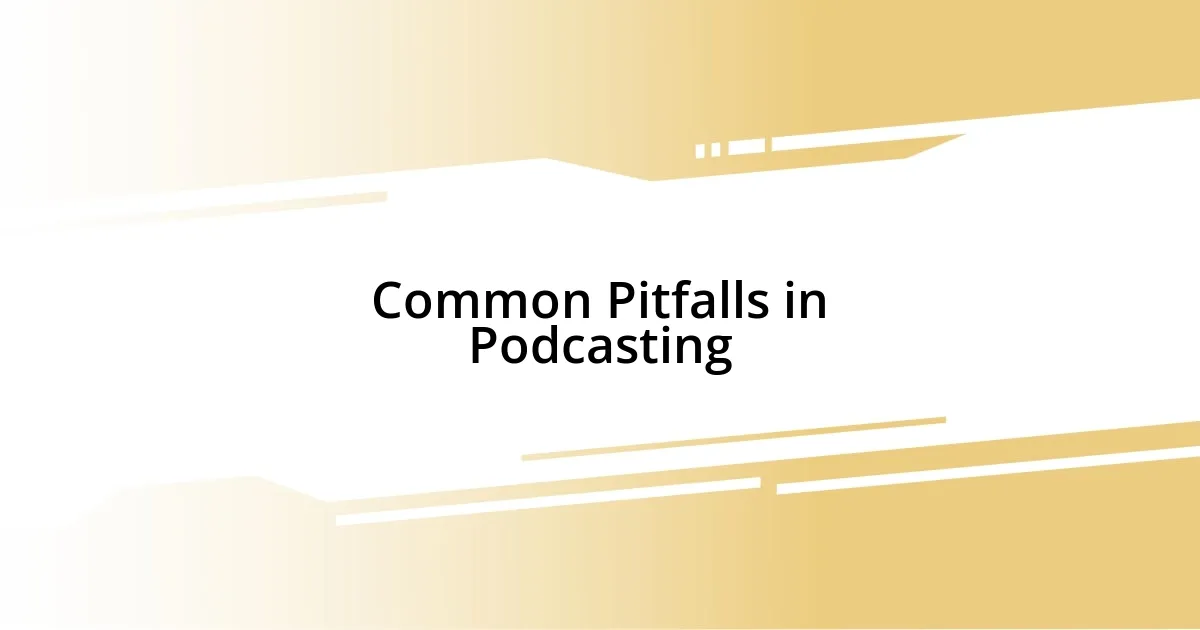
Common Pitfalls in Podcasting
One major pitfall I’ve encountered in podcasting is underestimating the importance of a clear niche. Early on, I was eager to cover all sorts of topics, thinking it would attract a broader audience. Instead, my episodes became a confusing mix that didn’t resonate with anyone. It became clear that a specific focus not only helps in developing content but also builds a loyal listener base.
Here are some common pitfalls I’ve seen others struggle with and I’ve encountered myself:
- Poor Audio Quality: Bad sound can drive listeners away faster than anything else.
- Inconsistent Release Schedule: Irregular episodes create a lack of trust and anticipation.
- Neglecting Promotion: Just having great content isn’t enough; you need to get it out there.
- Failing to Engage with Listeners: Ignoring feedback and questions can make your audience feel undervalued.
- Overlooking Editing: Sloppy editing can distract from your message and lead to unprofessional sounding episodes.
Each of these missteps can feel daunting, but I’ve found that recognizing them opens the door for growth and improvement.
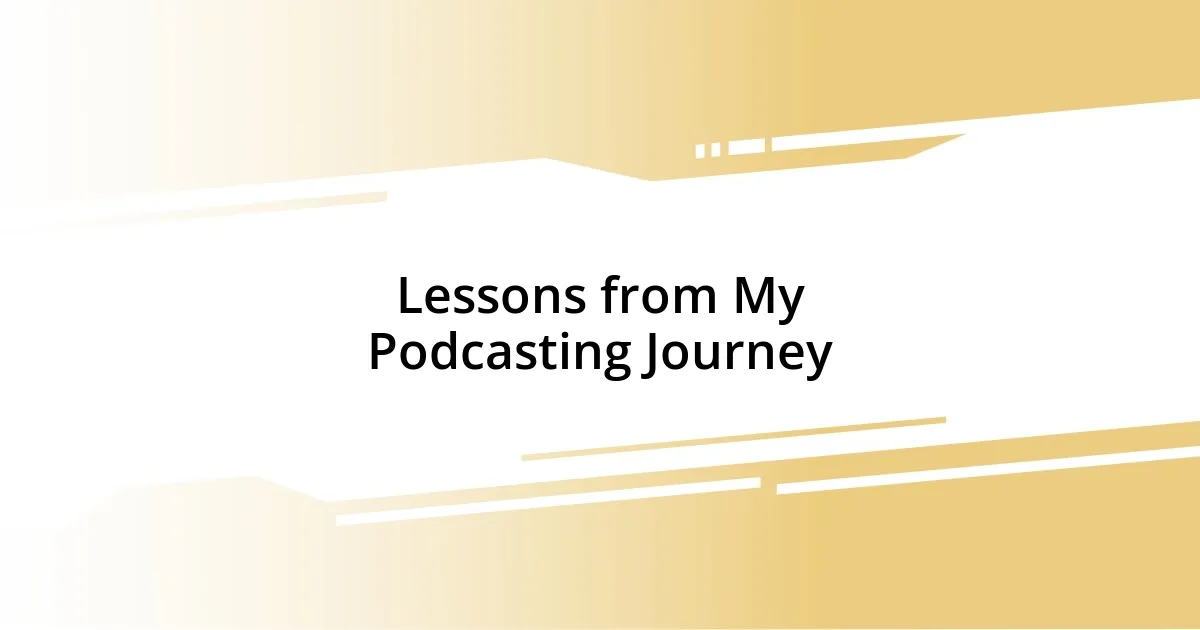
Lessons from My Podcasting Journey
At first, I thought that simply recording and posting an episode was enough to build an audience. How wrong I was! I vividly remember an early episode where I shared a compelling story, but I failed to promote it properly. As a result, barely anyone heard it. This taught me that effective marketing is as crucial as quality content. If you don’t put your work out there, it’s like shouting into the void.
I also learned that community engagement can make a massive difference. After one episode, I decided to encourage listeners to leave feedback. The response was overwhelming! Listeners shared their thoughts and even suggested topics. That interaction made me feel more connected to my audience and inspired me to create content that genuinely matched their interests. It reminded me that podcasting is not just about broadcasting; it’s about building a community.
Moreover, I learned that adaptability is essential in this journey. There was a time when a guest episode fell completely flat; the conversation was awkward and unengaging. Instead of being discouraged, I took notes on what went wrong and adjusted my future interviews to allow for a more natural flow. Embracing flexibility not only improved my podcast but also reinforced my resilience as a creator.
| Experience | Lesson Learned |
|---|---|
| Poor Promotion | Quality content needs effective marketing. |
| Engagement with Listeners | Building a community boosts audience connection. |
| Unsuccessful Guest Episode | Adaptability improves future content creation. |
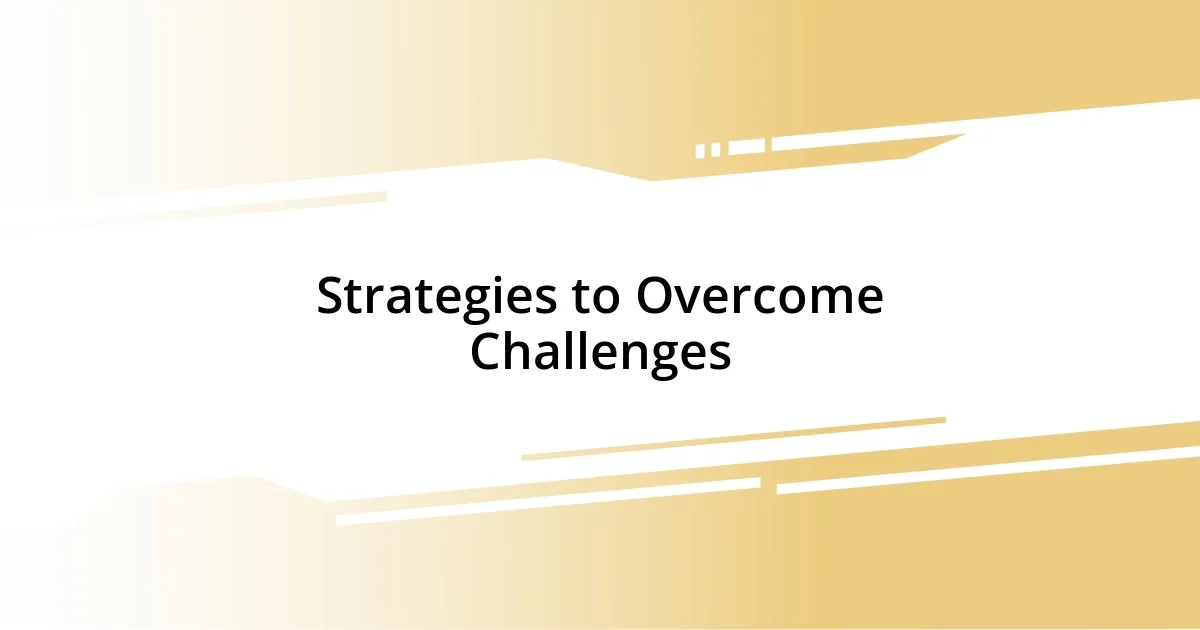
Strategies to Overcome Challenges
When facing the challenge of poor audio quality, I invested in a decent microphone and learned to utilize sound editing software. I remember the specific moment I played back a re-edited episode—the difference was shocking! This improvement showed me that addressing technical issues head-on could significantly elevate my podcast’s professionalism. Have you ever listened to a podcast with bad sound? It’s hard to stay engaged, isn’t it?
To tackle the inconsistency of my release schedule, I began creating a content calendar. I’d sit down each month to map out topics, recording sessions, and deadlines. This simple strategy not only kept me organized but also created a sense of accountability. When I finally released episodes on a regular schedule, I noticed my audience’s engagement surged. It made me realize how important consistency is in building trust with listeners.
Engaging with my audience was another area I knew I needed to improve. After one particularly lackluster episode, I decided to reach out on social media, asking listeners to share what they enjoyed and what could be better. The flood of feedback was enlightening! It turned a one-way conversation into a dialogue that made my audience feel heard and valued. Have you ever felt ignored by a creator you love? It’s disheartening. Every piece of feedback became a stepping stone for creating more relevant, engaging content.
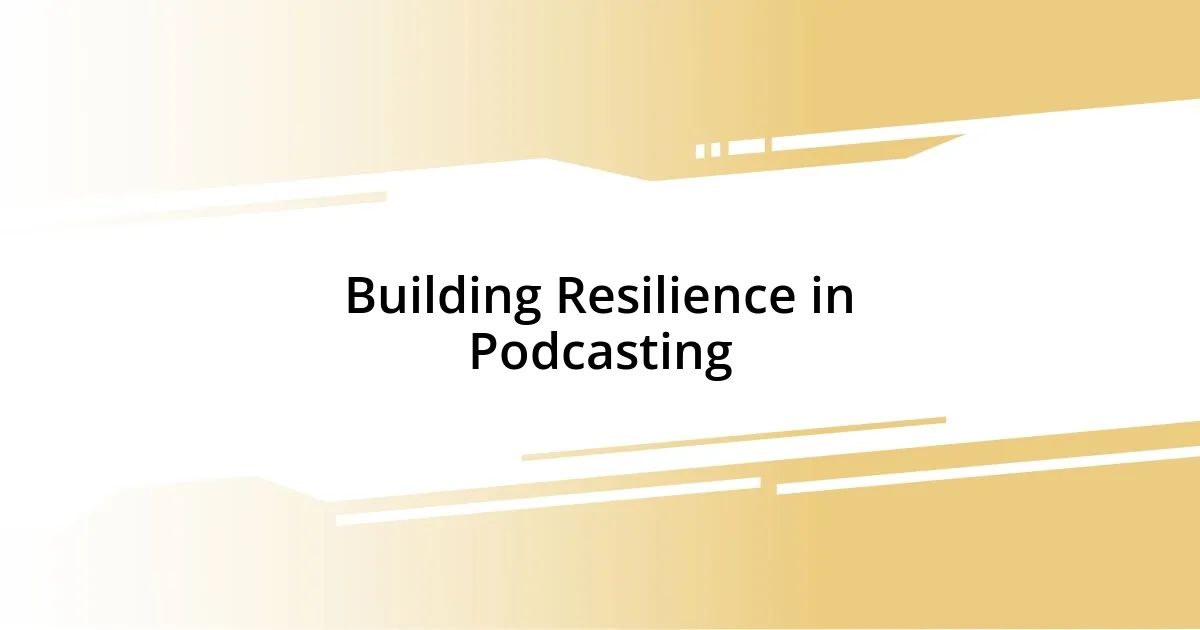
Building Resilience in Podcasting
Building resilience in podcasting is a vital lesson I’ve learned through trial and error. There was a time when I posted an episode that I felt was my best work, only to receive a lukewarm response. I remember feeling disheartened, questioning my abilities. However, after taking a step back, I realized that one episode doesn’t define my entire journey. It’s about the cumulative effort and learning from each step that truly counts. Have you ever felt like giving up after a setback? That’s normal, but pushing through builds character.
Embracing failure became my mantra. In one of my early attempts, I hosted a live episode that was riddled with technical glitches. It was mortifying at first—I even thought about pulling the episode altogether! But instead, I decided to own the experience, joking about the mishaps. To my surprise, listeners found it relatable and engaging. This taught me that vulnerability fosters connection. I’ve learned that our mistakes can enrich the narrative of our podcast, drawing listeners in rather than pushing them away.
Moreover, I realized the importance of maintaining a growth mindset. Each challenge, whether it’s a low listener count or negative feedback, is an opportunity in disguise. I recall a feedback session where a listener pointed out that my pacing was too quick. At first, I was defensive, but then I thought, “How can I make this better?” As I worked to slow down and enunciate, I noticed a significant uptick in positive responses. Transforming setbacks into lessons not only bolstered my resilience but also enriched my podcasting journey. Do you see how small changes can lead to big results? That’s the beauty of resilience in action.
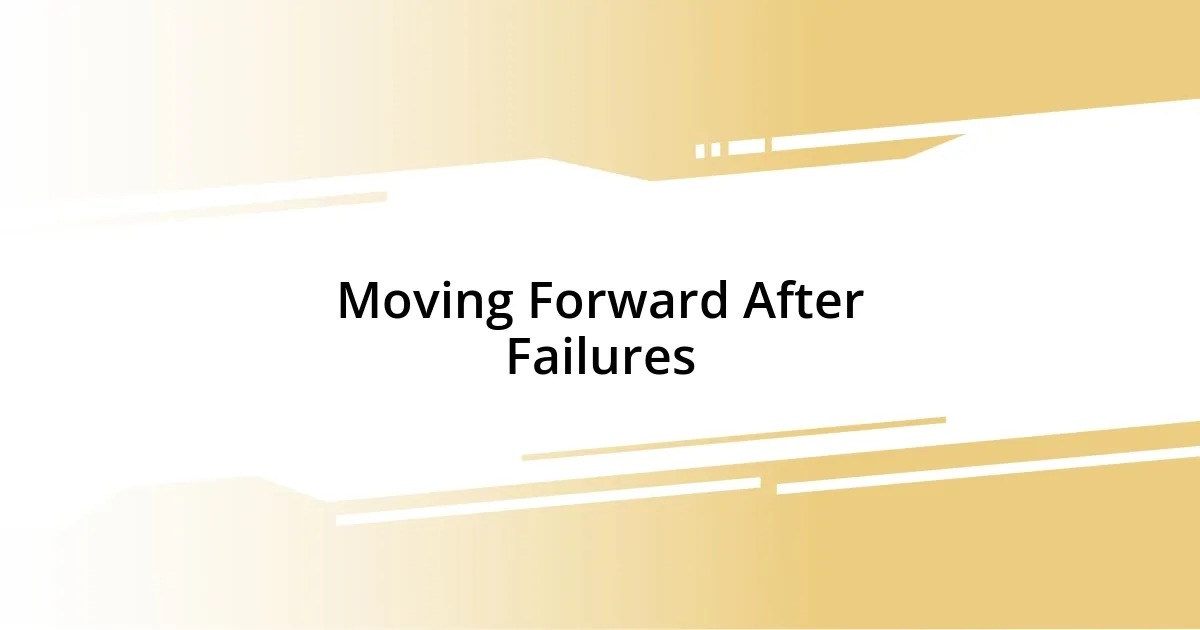
Moving Forward After Failures
Moving forward after failures can feel daunting, yet it’s often where the most growth happens. I vividly recall a moment when my podcast’s analytics revealed a sharp decline in listenership after a poorly received episode. I felt that familiar tightening in my chest, a mixture of disappointment and anxiety. But instead of succumbing to defeat, I chose to analyze what went wrong. Diving into listener feedback, I grasped the power of understanding my audience’s expectations. Do you think addressing mistakes is more valuable than celebrating successes? I do, and it’s through this lens that I learned to pivot my content strategy effectively.
As I moved past setbacks, I found that documenting my journey played a crucial role in fostering resilience. Keeping a journal of my thoughts, feelings, and actionable strategies taught me to reflect on my failures. This practice became a safe space to vent and brainstorm ways to improve. I learned to view failures not as dead ends but as puzzle pieces that fit into the bigger picture of my podcasting journey. Have you ever jotted down your experiences and seen how they connect? It can be transformative to map out your growth over time.
Every setback is an invitation to innovate. After experiencing a decline in engagement, I decided to experiment with different formats, like interviews and live Q&A sessions. I was nervous at first, fearing they might not resonate with my audience. Yet, taking that leap brought a wave of fresh energy into my podcast. Listeners responded positively, and suddenly, my content felt alive again. Have you ever taken a risk that changed everything for you? Embracing experimentation can lead to unexpected rewards, and I now approach failures not with dread, but with curiosity and excitement.
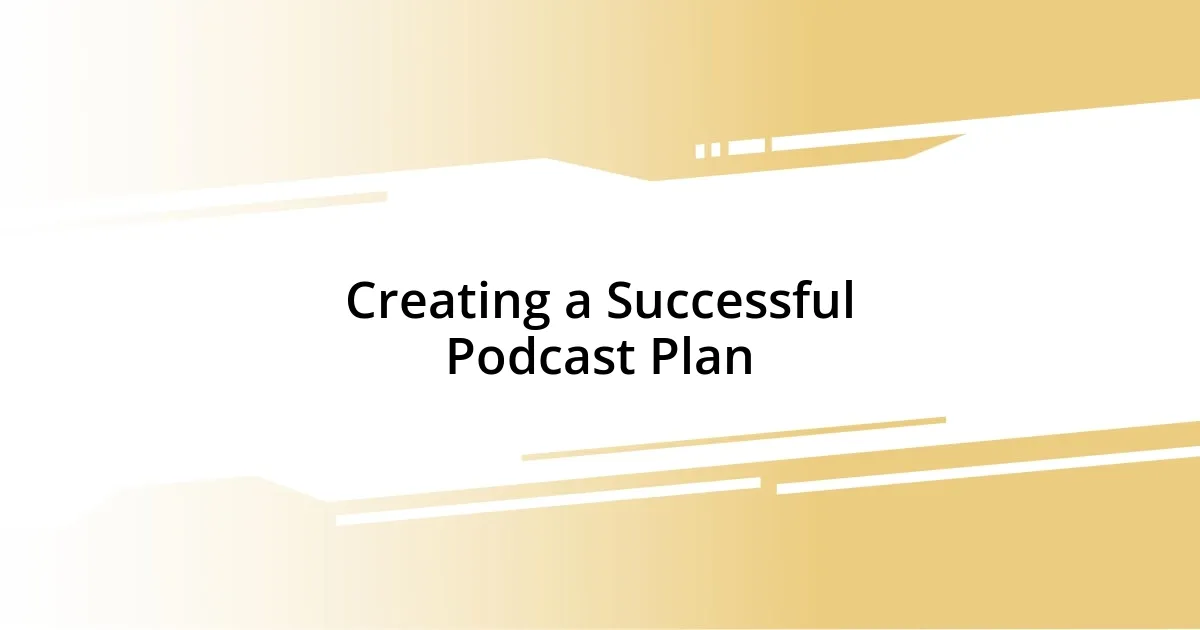
Creating a Successful Podcast Plan
Creating a successful podcast plan involves thorough research and a clear understanding of your target audience. I remember when I first started planning my podcast; I launched without a defined direction. My excitement overshadowed the need for strategy, and I quickly found myself lost in a sea of topics that didn’t resonate. Since then, I’ve learned that careful market research and audience analysis are essential first steps. Have you ever jumped into something without a plan, only to realize you needed one? It’s a common experience!
Another key element in my planning process is setting realistic and specific goals. In my early days, I aimed to become the next big podcast overnight, which led to disappointment. By breaking it down, I focused on achievable milestones, like consistent episode releases and engaging with listeners. In my experience, tracking progress toward these smaller goals kept me motivated and helped me celebrate small wins along the way. How do you plan to measure your success? It’s all about the journey, not just the destination.
Finally, I can’t stress enough the importance of flexibility within your plan. Plans are essential, yet they should remain adaptable. I recall a time when a planned guest couldn’t make it last minute. Instead of panicking, I decided to change course and do a solo episode on current industry trends. To my surprise, the episode resonated well with my audience! That moment taught me that sometimes, the best content comes from unexpected situations. Have you ever had to pivot unexpectedly? It can lead to some of the best creative breakthroughs.



